When hundreds of video cameras with the power to identify and track individuals started appearing in the streets of Belgrade as part of a major surveillance project, some protesters began having second thoughts about joining anti-government demonstrations in the Serbian capital.
Local authorities assert the system, created by Chinese telecommunications company Huawei, helps reduce crime in the city of 2 million. Critics contend it erodes personal freedoms, makes political opponents vulnerable to retribution and even exposes the country's citizens to snooping by the Chinese government.
Click to Gallery
Besides Serbia, that list includes Turkey, Russia, Ukraine, Azerbaijan, Angola, Laos, Kazakhstan, Kenya and Uganda, as well as a few liberal democracies like Germany, France and Italy. The system is used in some 230 cities, exposing tens of millions of people to its screening.
When hundreds of video cameras with the power to identify and track individuals started appearing in the streets of Belgrade as part of a major surveillance project, some protesters began having second thoughts about joining anti-government demonstrations in the Serbian capital.
"The system can be used to trail political opponents, monitor regime critics at any moment, which is completely against the law," said Serbia's former commissioner for personal data protection, Rodoljub Sabic.
While facial recognition technology is being adopted in many countries, spurring debate over the balance between privacy and safety, the Huawei system has gained extra attention due to accusations that Chinese laws requiring companies to assist in national intelligence work give authorities access to its data.
Besides Serbia, that list includes Turkey, Russia, Ukraine, Azerbaijan, Angola, Laos, Kazakhstan, Kenya and Uganda, as well as a few liberal democracies like Germany, France and Italy. The system is used in some 230 cities, exposing tens of millions of people to its screening.
In view of the cybersecurity accusations leveled by the U.S. and international rights groups against Huawei, the relationship between China and countries that use the company's technology is coming under renewed scrutiny.
It's a similar story in Uganda, where China has invested heavily in infrastructure like highways and a hydropower dam on the Nile.
The cameras, equipped with facial recognition technology, are being rolled out across hundreds of cities around the world, particularly in poorer countries with weak track records on human rights where Beijing has increased its influence through big business deals. With the United States claiming that Chinese state authorities can get backdoor access to Huawei data, the aggressive rollout is raising concerns about the privacy of millions of people in countries with little power to stand up to China.

In this photo taken Sept. 25, 2019, members of a rights group paint a face with makeup to confuse the Huawei surveillance video cameras with face-recognition software in Belgrade, Serbia. With public authorities disclosing little about how the cameras work, the group has set up a tent to ask pedestrians whether they know they are being watched. (AP PhotoDarko Vojinovic)
"The system can be used to trail political opponents, monitor regime critics at any moment, which is completely against the law," said Serbia's former commissioner for personal data protection, Rodoljub Sabic.
Groups opposed to Serbian President Aleksandar Vucic say police are leaking video of protests to pro-government media, which publish the images, along with the identities of participants. Vucic himself has boasted the police have the capability to count "each head" at anti-government gatherings. During a recent rally, protesters climbed up a pole and covered a camera lens with duct tape scrawled with the word "censored."
Serbian police deny any such abuse of the Huawei system, which will eventually encompass 1,000 cameras in 800 locations throughout Belgrade. Huawei said in a statement that it "complies with all applicable laws and regulations" in Serbia and anywhere else it does business.
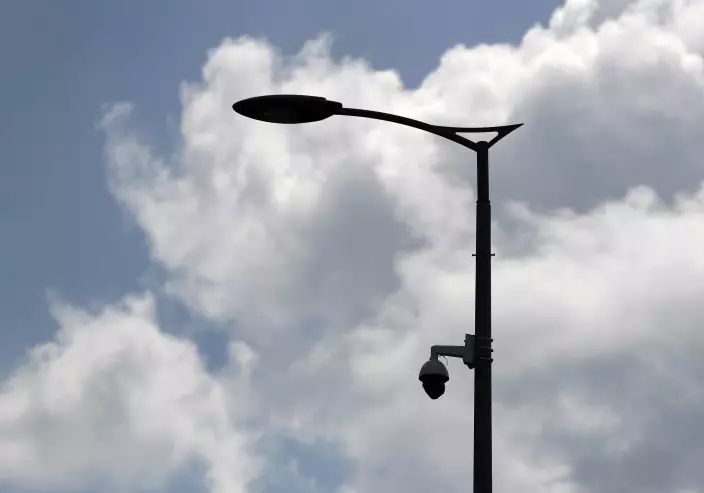
In this photo taken July 17, 2019, a high-tech video camera hangs from a lamppost in Belgrade, Serbia. A video surveillance system with facial recognition by Chinese tech giant Huawei is being rolled out across hundreds of cities worldwide, particularly in poor countries with weak track records on human rights where Beijing has increased its influence through big business deals. (AP PhotoDarko Vojinovic)
While facial recognition technology is being adopted in many countries, spurring debate over the balance between privacy and safety, the Huawei system has gained extra attention due to accusations that Chinese laws requiring companies to assist in national intelligence work give authorities access to its data.
As a result, some countries are reconsidering using Huawei technology, particularly the superfast 5G networks that are being rolled out later this year.
Still, Huawei, which denies accusations of any Chinese government control, has had no trouble finding customers eager to install its so-called Safe Cities technology, particularly among countries that China has brought closer into its diplomatic and economic orbit.

In this photo taken Sept. 25, 2019, a young Serbian rights group activist has her face painted to confuse the Huawei surveillance video cameras with face-recognition software installed in Belgrade, Serbia. With public authorities disclosing little about how the cameras work, the group has set up a tent to ask pedestrians whether they know they are being watched. (AP PhotoDarko Vojinovic)
Besides Serbia, that list includes Turkey, Russia, Ukraine, Azerbaijan, Angola, Laos, Kazakhstan, Kenya and Uganda, as well as a few liberal democracies like Germany, France and Italy. The system is used in some 230 cities, exposing tens of millions of people to its screening.
In a promotional brochure, Huawei says its video surveillance technology can scan over long distances to detect "abnormal behavior" such as loitering, track the movement of cars and people, calculate crowd size and send alerts to a command center if it detects something suspicious. Local authorities can then act upon the information they receive.
In one case advertised on its website, the company says a suspect in a hit-and-run accident in Belgrade was later discovered in China with the help of face recognition data shared by the Serbian police with their Chinese counterparts.
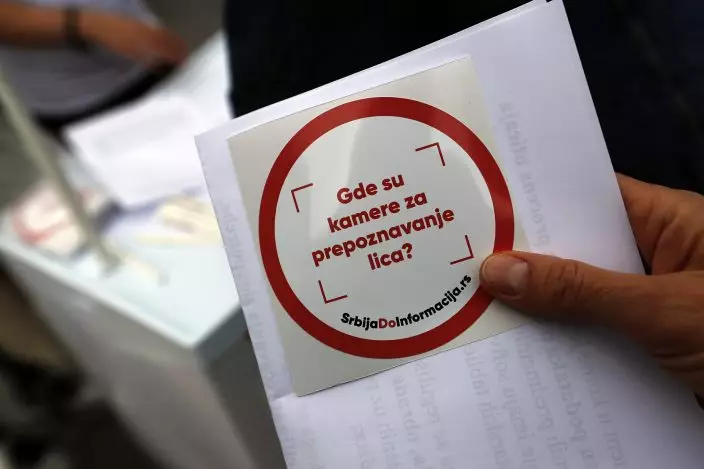
In this photo taken Sept. 25, 2019, an activist in the Serbian capital, Belgrade, shares stickers that read: ''Where are cameras for face recognition?'' With public authorities disclosing little about how the surveillance system works, the rights group has set up a tent to ask pedestrians whether they know they are being watched. (AP PhotoDarko Vojinovic)
In view of the cybersecurity accusations leveled by the U.S. and international rights groups against Huawei, the relationship between China and countries that use the company's technology is coming under renewed scrutiny.
China's influence in Serbia, a European Union candidate that Beijing views as a gateway to the continent, has significantly expanded in recent years through Beijing's global Belt and Road investment programs. The populist Serbian regime has been keen to develop closer ties and the country's fragile democracy allows China's economic interests to grow relatively unchecked, without raising too many questions about human rights, environmental standards or transparency.
China's state investment bank has granted billions of dollars in easy-term loans to build coal-powered plants, roads, railroads and bridges. Chinese police officers even help patrol the streets of Belgrade, a security presence officially billed as assisting the growing number of Chinese tourists who visit the city.
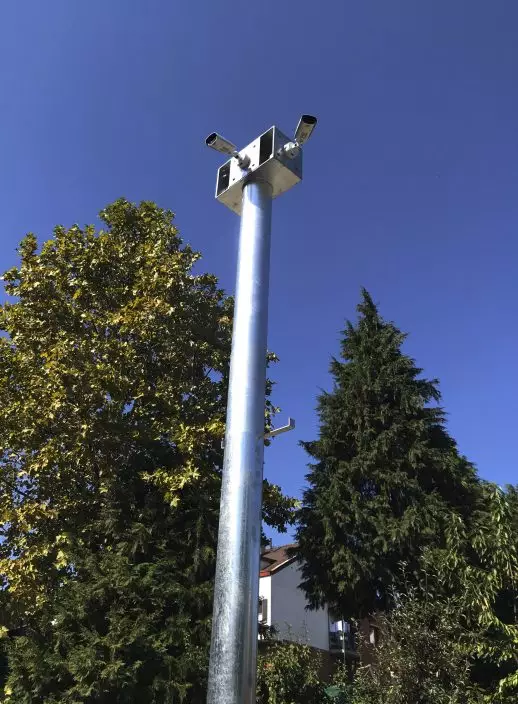
In this Oct 2, 2019, photo, cameras hang from a pole in Belgrade, Serbia. A video surveillance system with facial recognition by Chinese tech giant Huawei is being rolled out across hundreds of cities worldwide, particularly in poor countries with weak track records on human rights where Beijing has increased its influence through big business deals. (AP PhotoDusan Stojanovic)
It's a similar story in Uganda, where China has invested heavily in infrastructure like highways and a hydropower dam on the Nile.
When longtime President Yoweri Museveni launched a $126-million project to install Huawei facial recognition systems a year ago, he said the cameras were "eyes, ears and a nose" to fight rampant street crime in the sprawling capital, Kampala. Opposition activists say the real goal is to deter street protesters against an increasingly unpopular government.
"The cameras are politically motivated," said Joel Ssenyonyi, a spokesman for the musician and activist known as Bobi Wine who has emerged as a powerful challenger to Museveni. "They are not doing this for security. The focus for them is hunting down political opponents."
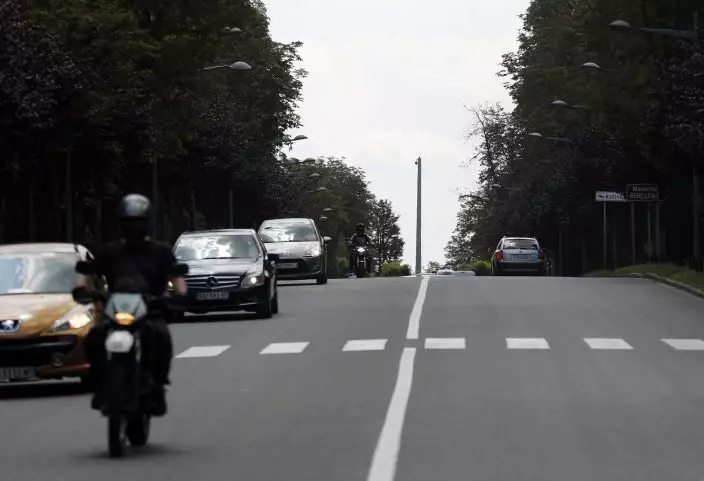
In this photo July 17, 2019, photo shows a high-tech video camera on a pillar in Belgrade, Serbia. When hundreds of new video cameras with the power to identify and track individuals mysteriously started appearing in the streets of Belgrade as part of a major surveillance project, some regular protesters begun having second thoughts about joining anti-government demonstrations in the Serbian capital. (AP PhotoDarko Vojinovic)
In neighboring Kenya, the government has also renewed its focus on public safety after a spate of extremist attacks. It has been pushing to register people digitally, including by recording DNA, iris and facial data. To do so, it turned to China, which helped finance the installation of surveillance cameras in Kenya as far back as 2012.
The Kenyan government wants to pool into one database all the information from public and private CCTV cameras, including those with facial recognition technology, a move that activists warn would vastly expand its surveillance powers in a country that does not have comprehensive data protection laws.
A growing number of countries are following China's lead in deploying artificial intelligence to track citizens, according to the Carnegie Endowment for International Peace. The group says at least 75 countries are actively using AI tools such as facial recognition for surveillance — and Huawei has sold its systems in 50 of those countries, giving it a far wider reach than competitors such as Japan-based NEC and U.S.-based IBM.
"It's very unclear what safeguards are being put in place," said Steven Feldstein, a Carnegie Endowment fellow who authored a report on the issue. "Where are images being stored? How long are they being stored for? What kind of accountability procedures will there be? What type of operations will be linked to these surveillance cameras?"
Huawei said in an emailed statement that it "complies with all applicable laws and regulations in our countries of business. This is the most fundamental principle of our business operations. We are dedicated to bringing people better connectivity, eliminating digital gaps, and promoting the sustainable development of our societies and economies."
In Belgrade's bustling downtown Republic Square, high-tech video cameras are pointed in all directions from an office building as pedestrians hurry about their everyday business.
With public authorities disclosing little about how the cameras work, a rights group has set up a tent to ask pedestrians whether they know they are being watched.
"We don't want to be in some kind of Big Brother society," said rights activist Ivana Markulic. "We are asking: Where are the cameras, where are they hidden, how much did we pay for them and what's going to happen with information collected after this surveillance?"
Associated Press writers Jovana Gec in Belgrade, Serbia; Rodney Muhumuza in Kampala, Uganda; Tom Obula in Nairobi, Kenya, and Matt O'Brien in Providence, Rhode Island, contributed to this report.
PARIS (AP) — French President Emmanuel Macron warned Thursday that Europe could “die” if it fails to build its own robust defense as Russia’s war in Ukraine rages on, or if it fails to undertake major trade and economic reforms to compete with China and the U.S.
Macron urged Europeans to become more ambitious in a fast-changing world to face the challenges of war, fierce trade competition, energy scarcity, climate change and increasing authoritarianism.
In a nearly two-hour speech at Sorbonne University in Paris, Macron said that the continent is divided and “too slow and lacks ambition” at a time when the 27-member European Union needs to become a superpower, defend its own borders and speak with one voice if it wants to survive and thrive.
“Our Europe today is mortal,” Macron said. “It can die and that depends solely on our choices,” he added. He called on people to make those choices now because, “it’s today that Europe is between war and peace.”
Russia's full-scale invasion of Ukraine, now in its third year, is an existential threat and Europe isn't armed enough to defend itself when “confronted by a power like Russia that has no inhibitions, no limits,” Macron said.
‘Our ability to ensure our security is at stake," Macron said. “Russia mustn’t be allowed to win.”
Europe now has the “good fortune” of having the Biden administration’s commitment to supporting Ukraine, Macron said. But, in a year of key elections around Europe, in the U.S. and elsewhere, support may fragment or disappear entirely, he added.
“Europe must become capable of defending its interests, with its allies by our side whenever they are willing, and alone if necessary,” Macron said.
Strong armies, a European rapid intervention program and force, tanks, a missile shield and other weapons, produced in Europe, will need the support of “a joint diplomatic force that will speak with one voice and build bridges with Africa and Latin America,” the French leader said.
“Only then will Europe show that it's not a United States’ lap dog, and that it also knows how to talk to other regions of the world,” he said.
France has been a firm supporter of Ukraine in its fight against Russian aggression, and Macron has often clashed with other Western leaders as he has insisted that Europe must stand by the country at any cost. The French president alarmed European leaders by saying recently that sending Western troops into Ukraine to shore up its defenses shouldn’t be ruled out.
Referring to trade practices of China and the U.S., Macron said “the two world powers have decided not to respect the rules of global trade” by shoring up protections and subsides while Europe’s industry remains open and is stuck in overregulation.
“Let’s do the same, we are in competition,” Macron said.
“We must buy faster, we must produce more and we must buy more that is made in Europe. That is key,” Macron said.
Thursday's speech came less than two months before a pivotal European Parliament election.
Macron, an avid advocate of a united and assertive Europe, also rallied support for his centrist Renaissance party before the June 6-9 vote as far-right parties lead the moderate coalitions in the polls. He called for safeguarding democratic values as the “authoritarian model” was becoming “more popular” across the continent.
The war in Ukraine and immigration are top priorities for European Union voters, according to polls. Far-right parties have gained support by criticizing Macron’s government policies on both issues. Macron acknowledged divisions on immigration policies, including on asylum and deportation rules for those who have arrived to Europe illegally.
He emphasized the need for an effective response and Europe-wide coordination for curbing illegal immigration, closer cooperation with immigrants' countries of origin and a unified, relentless fight against human traffickers.
Macron criticized the idea of striking an agreement, as Britain as done, with countries in Africa and elsewhere to transfer immigrants there.
“This is a betrayal of our values that ultimately leads us to dependency on other counties,” Macron said.
The British government earlier this week approved a law allowing the deportation of some migrants who enter the country illegally to Rwanda.
Macron lost his majority in France’s most influential house of parliament, the National Assembly, after the 2022 election to the far-left coalition and the far-right National Rally party.
The social situation in France remains tense as Paris prepares to host the Olympic Games this summer, amid protests from teachers and police officers, and farmer demonstrations in recent weeks. The protests follow huge rallies last year against Macron’s ultimately successful proposal to increase the retirement age from 62 to 64.
Barbara Surk reported from Nice, France. Lorne Cook contributed to this report from Brussels.
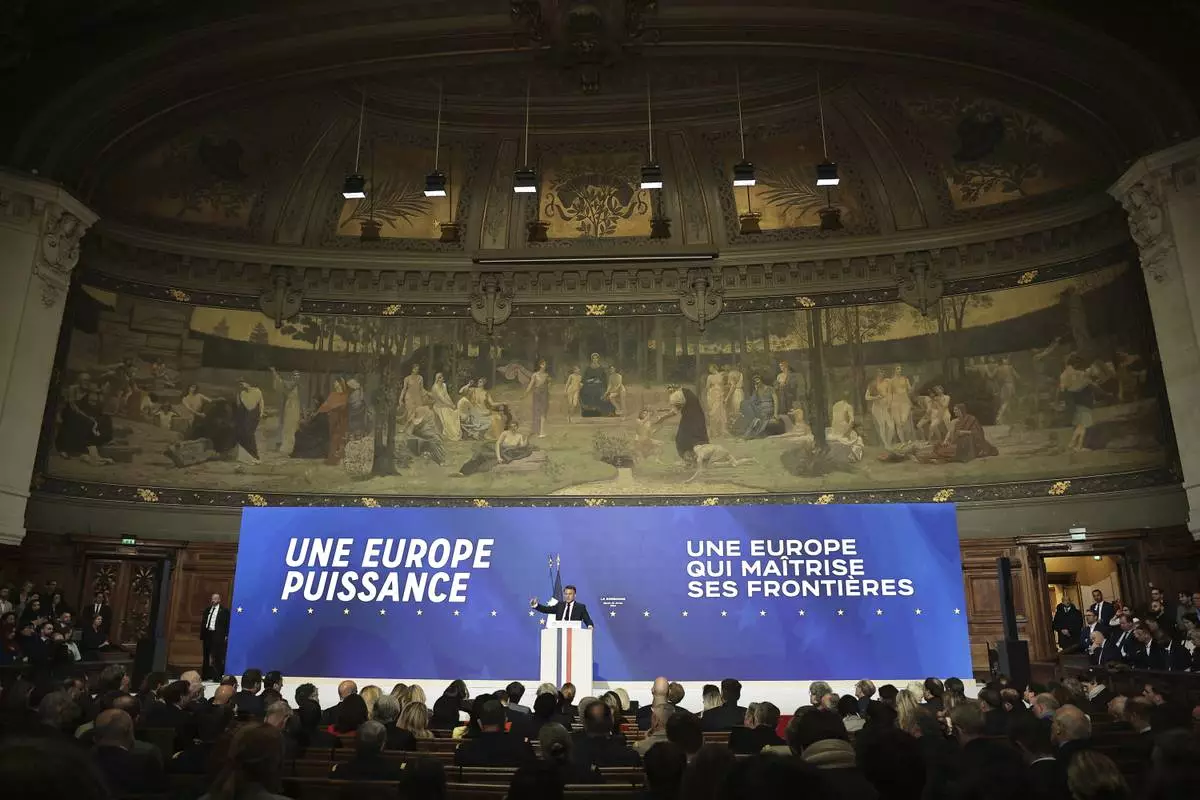
French President Emmanuel Macron delivers a speech on Europe in the amphitheater of the Sorbonne University, Thursday, April 25 in Paris. 2024. French President Emmanuel Macron will outline his vision for Europe as a more assertive global power at the backdrop of war in Ukraine, security, and economic challenges in a speech ahead of pivotal election for the European Parliament in June. (Christophe Petit Tesson, Pool via AP)
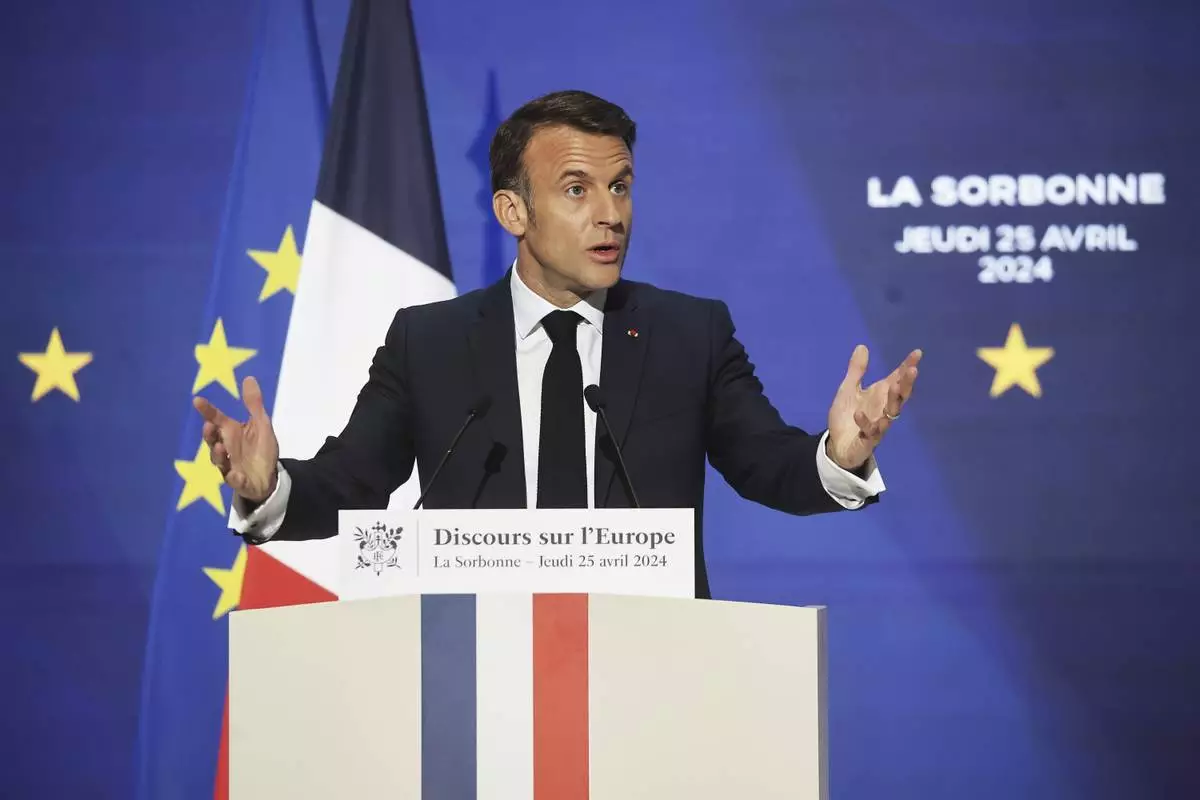
French President Emmanuel Macron delivers a speech on Europe in the amphitheater of the Sorbonne University, Thursday, April 25 in Paris. 2024. French President Emmanuel Macron will outline his vision for Europe as a more assertive global power at the backdrop of war in Ukraine, security, and economic challenges in a speech ahead of pivotal election for the European Parliament in June. (Christophe Petit Tesson, Pool via AP)
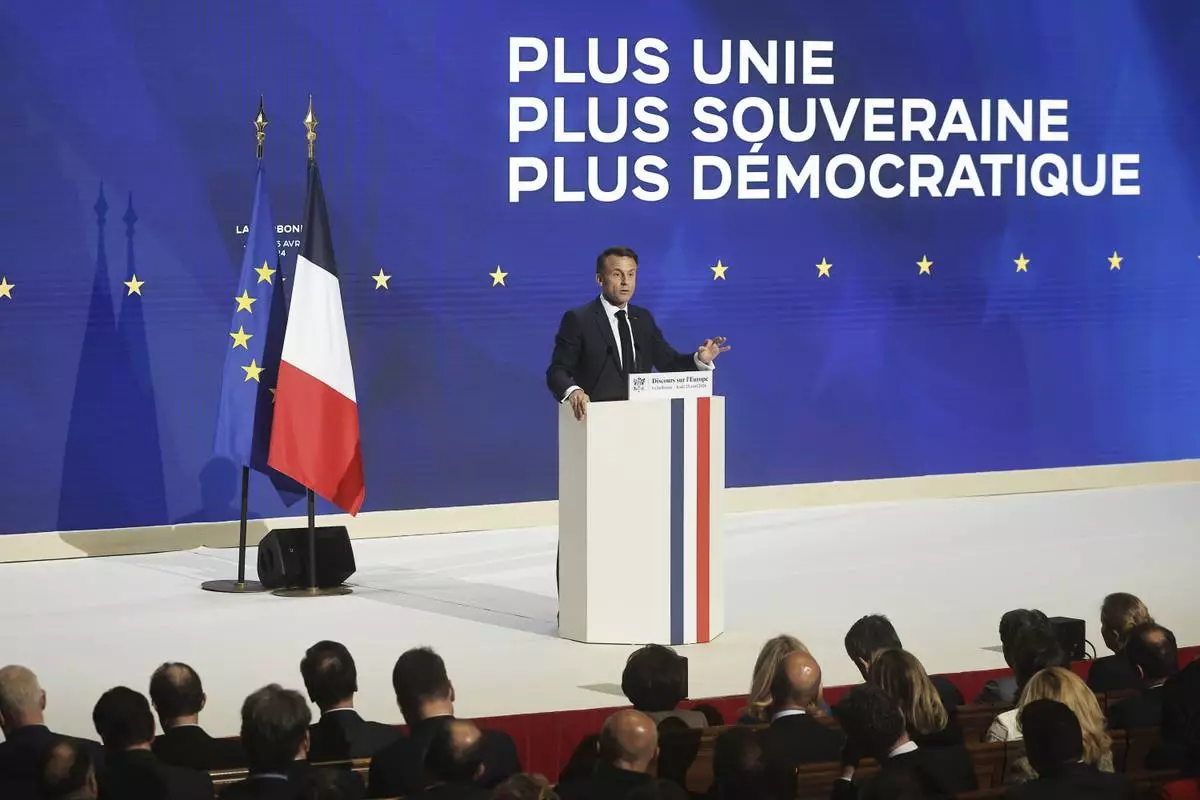
French President Emmanuel Macron delivers a speech on Europe in the amphitheater of the Sorbonne University, Thursday, April 25 in Paris. 2024. French President Emmanuel Macron will outline his vision for Europe as a more assertive global power at the backdrop of war in Ukraine, security, and economic challenges in a speech ahead of pivotal election for the European Parliament in June. (Christophe Petit Tesson, Pool via AP)
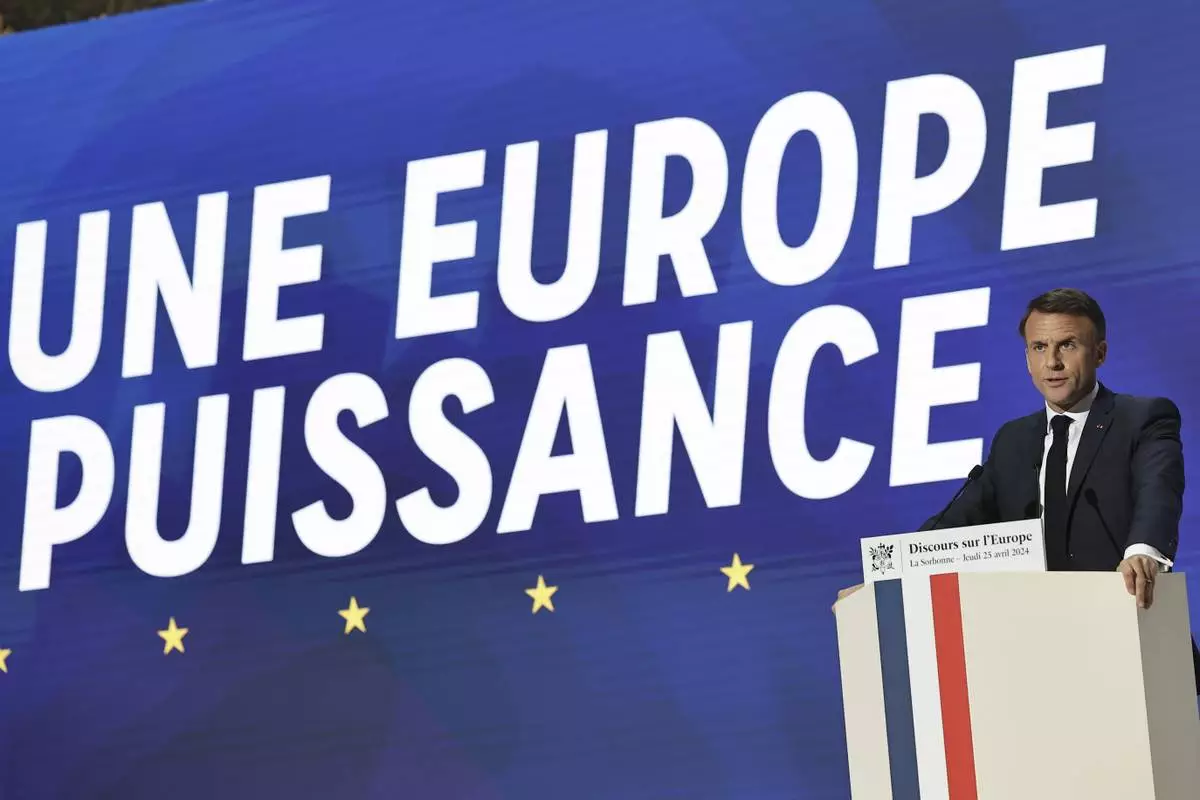
French President Emmanuel Macron delivers a speech on Europe in the amphitheater of the Sorbonne University, Thursday, April 25 in Paris. 2024. French President Emmanuel Macron will outline his vision for Europe as a more assertive global power at the backdrop of war in Ukraine, security, and economic challenges in a speech ahead of pivotal election for the European Parliament in June. (Christophe Petit Tesson, Pool via AP)
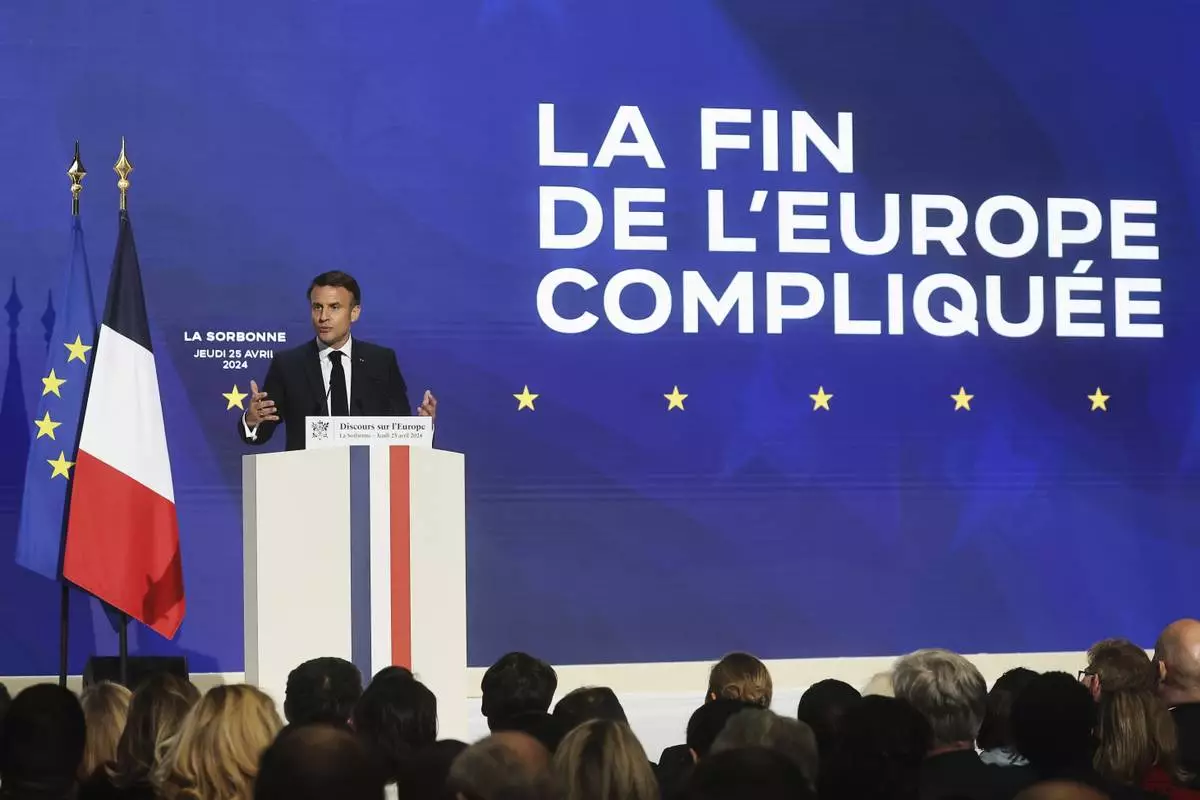
French President Emmanuel Macron delivers a speech on Europe in the amphitheater of the Sorbonne University, Thursday, April 25 in Paris. 2024. French President Emmanuel Macron will outline his vision for Europe as a more assertive global power at the backdrop of war in Ukraine, security, and economic challenges in a speech ahead of pivotal election for the European Parliament in June. (Christophe Petit Tesson, Pool via AP)
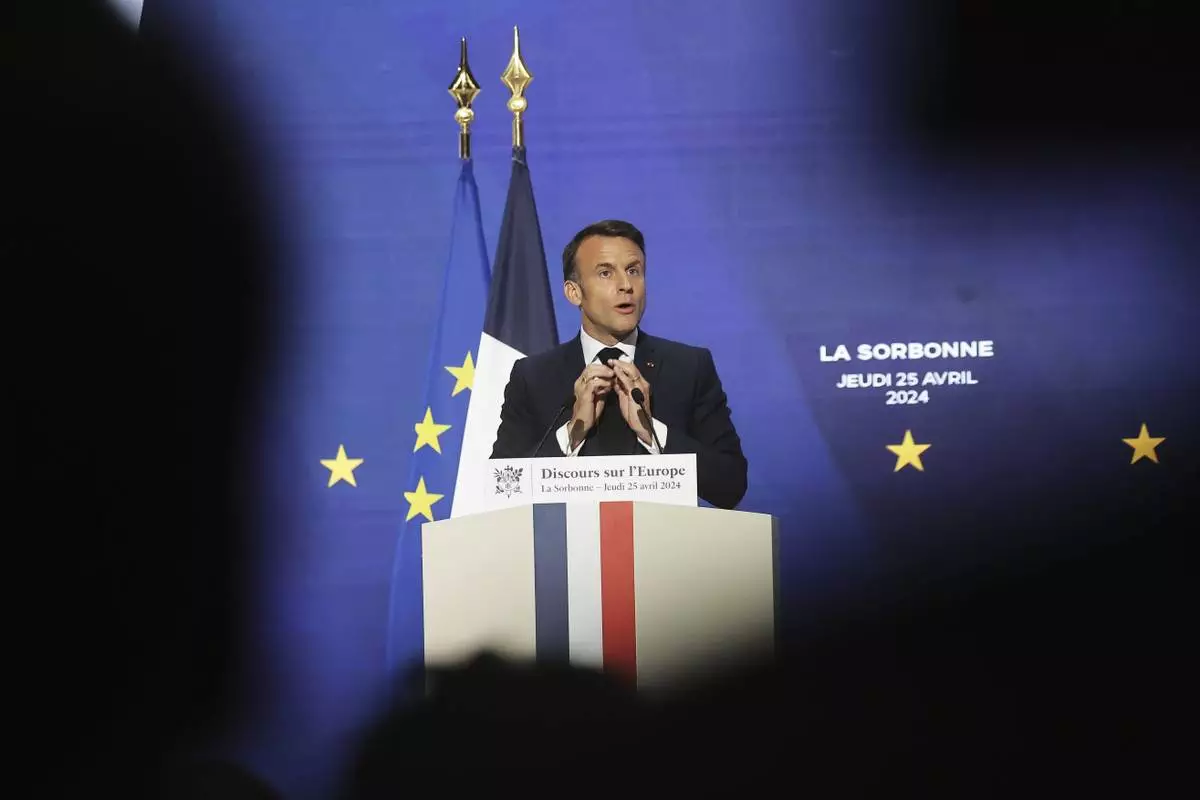
French President Emmanuel Macron delivers a speech on Europe in the amphitheater of the Sorbonne University, Thursday, April 25 in Paris. 2024. French President Emmanuel Macron will outline his vision for Europe as a more assertive global power at the backdrop of war in Ukraine, security, and economic challenges in a speech ahead of pivotal election for the European Parliament in June. (Christophe Petit Tesson, Pool via AP)
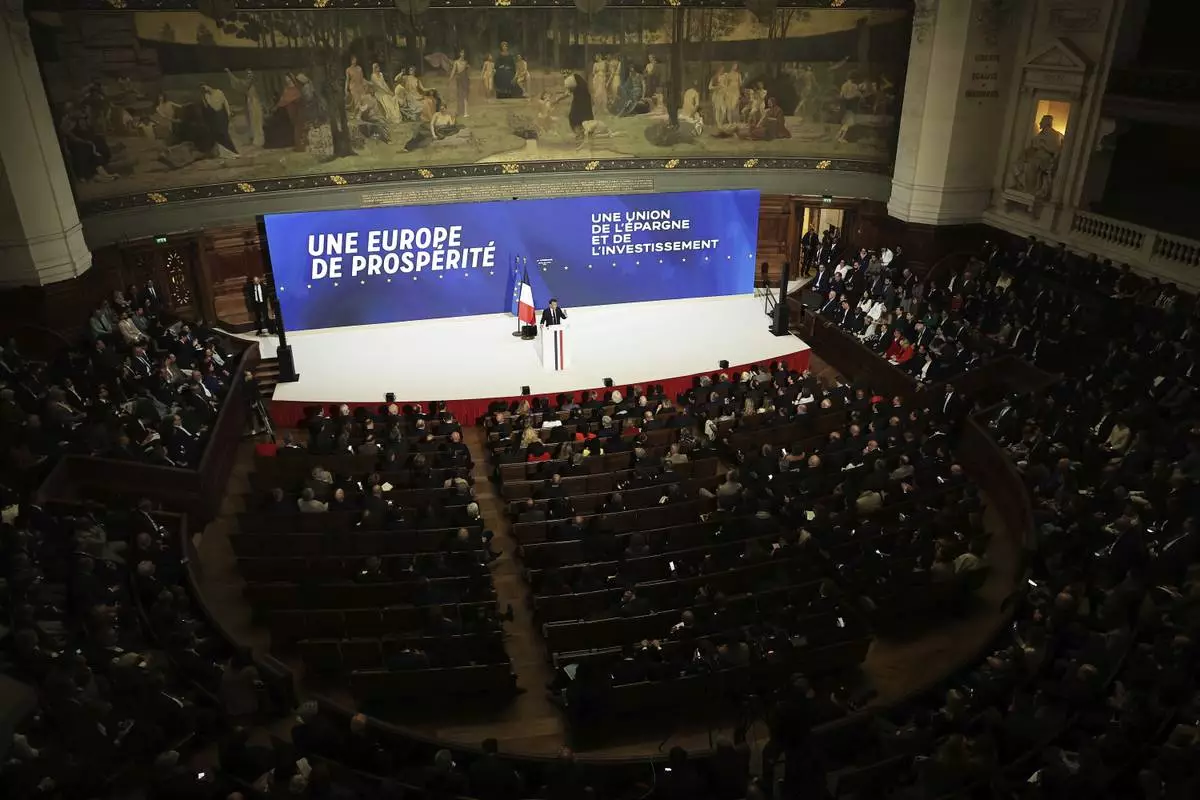
French President Emmanuel Macron delivers a speech on Europe in the amphitheater of the Sorbonne University, Thursday, April 25 in Paris. 2024. French President Emmanuel Macron will outline his vision for Europe as a more assertive global power at the backdrop of war in Ukraine, security, and economic challenges in a speech ahead of pivotal election for the European Parliament in June. (Christophe Petit Tesson, Pool via AP)
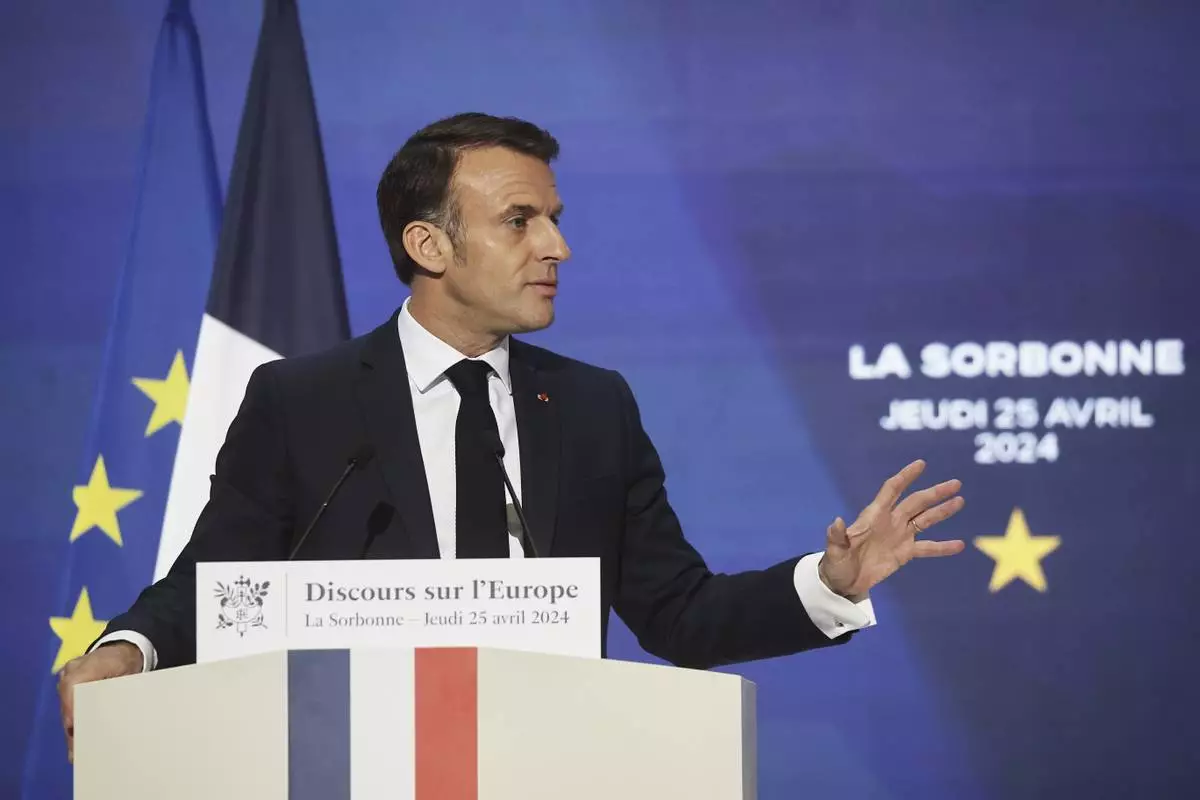
French President Emmanuel Macron delivers a speech on Europe in the amphitheater of the Sorbonne University, Thursday, April 25 in Paris. 2024. French President Emmanuel Macron will outline his vision for Europe as a more assertive global power at the backdrop of war in Ukraine, security, and economic challenges in a speech ahead of pivotal election for the European Parliament in June. (Christophe Petit Tesson, Pool via AP)
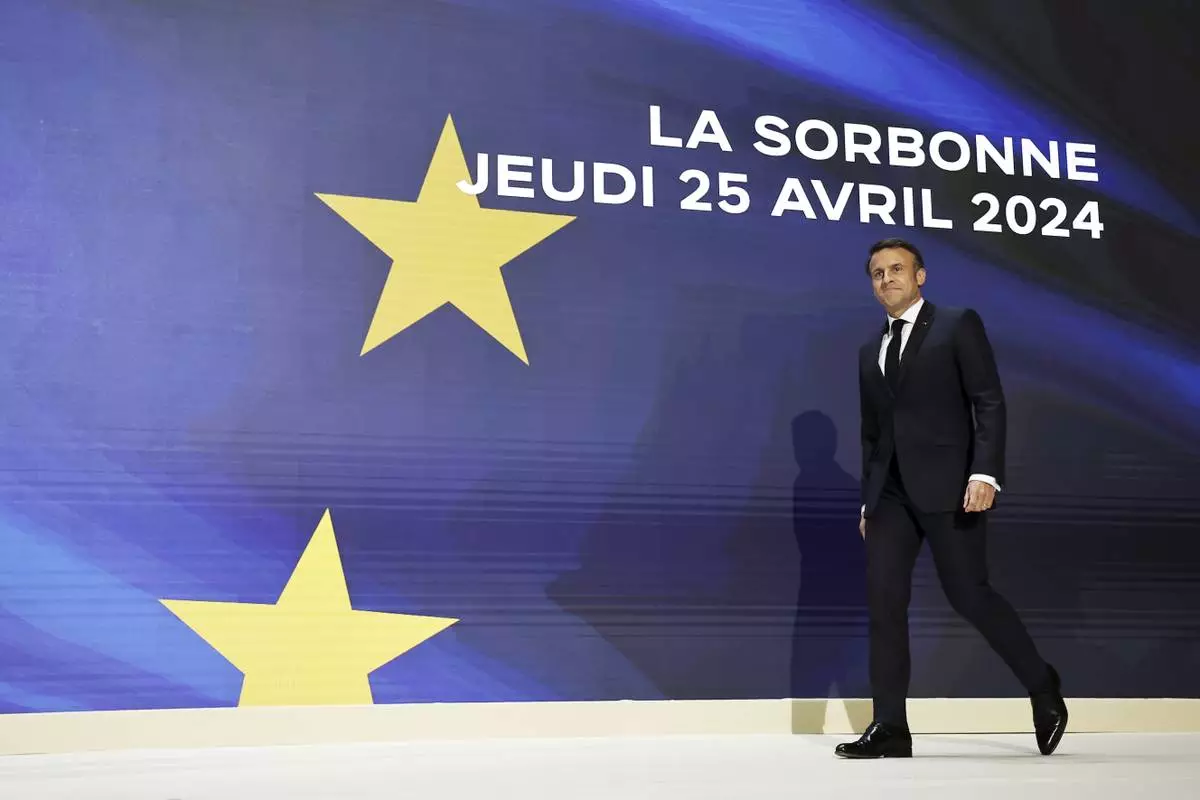
French President Emmanuel Macron arrives to deliver a speech on Europe in the amphitheater of the Sorbonne University, Thursday, April 25 in Paris. 2024. French President Emmanuel Macron will outline his vision for Europe as a more assertive global power at the backdrop of war in Ukraine, security, and economic challenges in a speech ahead of pivotal election for the European Parliament in June. (Christophe Petit Tesson, Pool via AP)
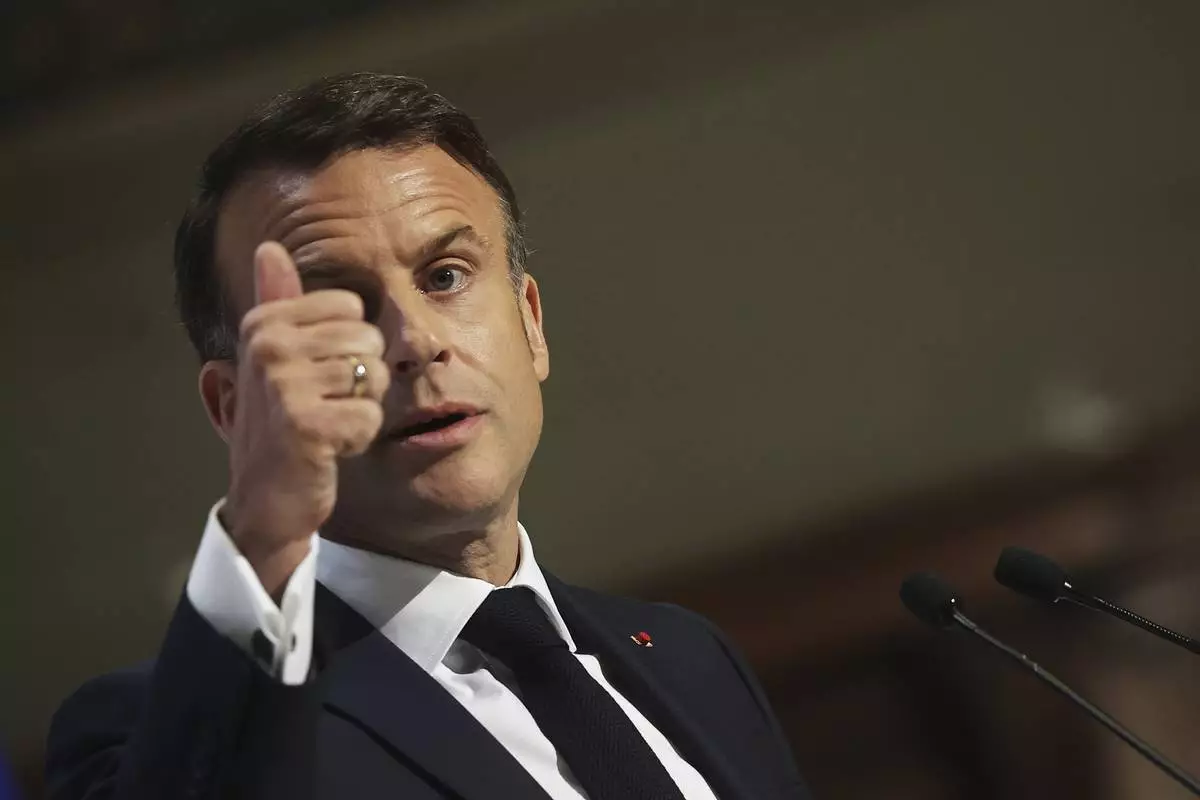
French President Emmanuel Macron delivers a speech on Europe in the amphitheater of the Sorbonne University, Thursday, April 25 in Paris. 2024. French President Emmanuel Macron will outline his vision for Europe as a more assertive global power at the backdrop of war in Ukraine, security, and economic challenges in a speech ahead of pivotal election for the European Parliament in June. (Christophe Petit Tesson, Pool via AP)
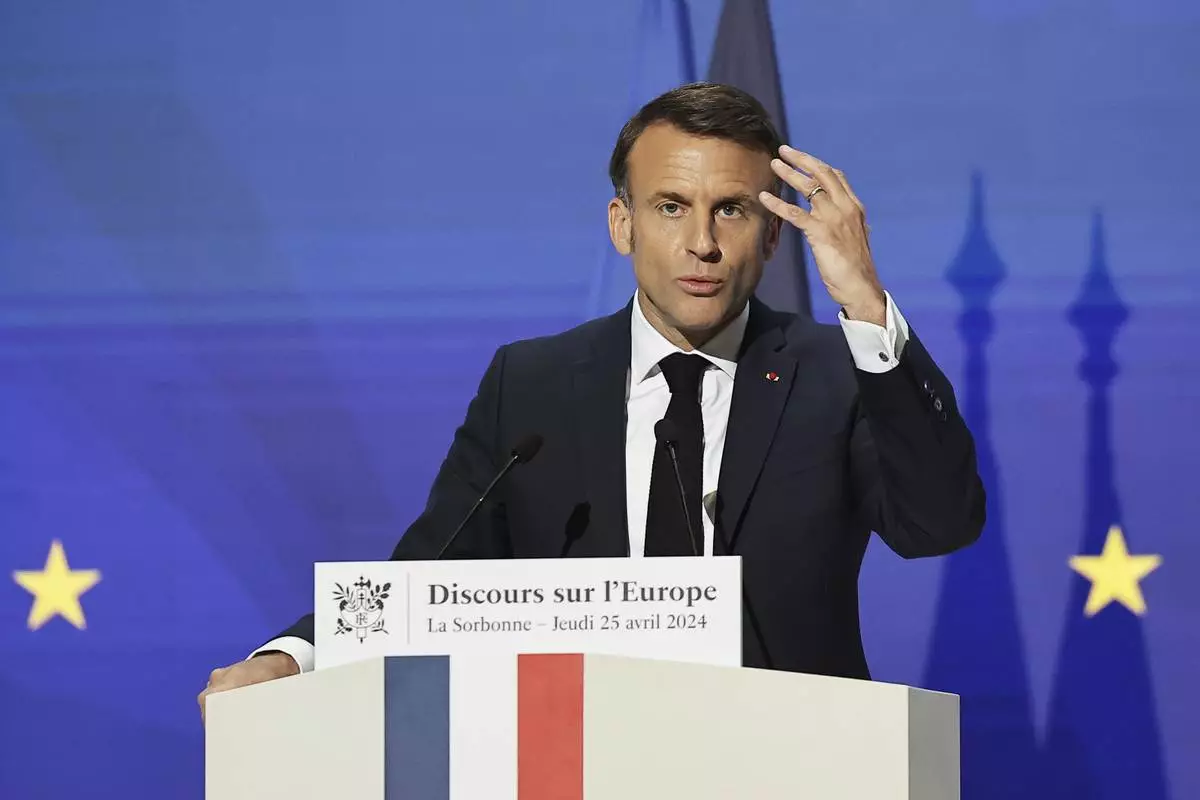
French President Emmanuel Macron delivers a speech on Europe in the amphitheater of the Sorbonne University, Thursday, April 25 in Paris. 2024. French President Emmanuel Macron will outline his vision for Europe as a more assertive global power at the backdrop of war in Ukraine, security, and economic challenges in a speech ahead of pivotal election for the European Parliament in June. (Christophe Petit Tesson, Pool via AP)
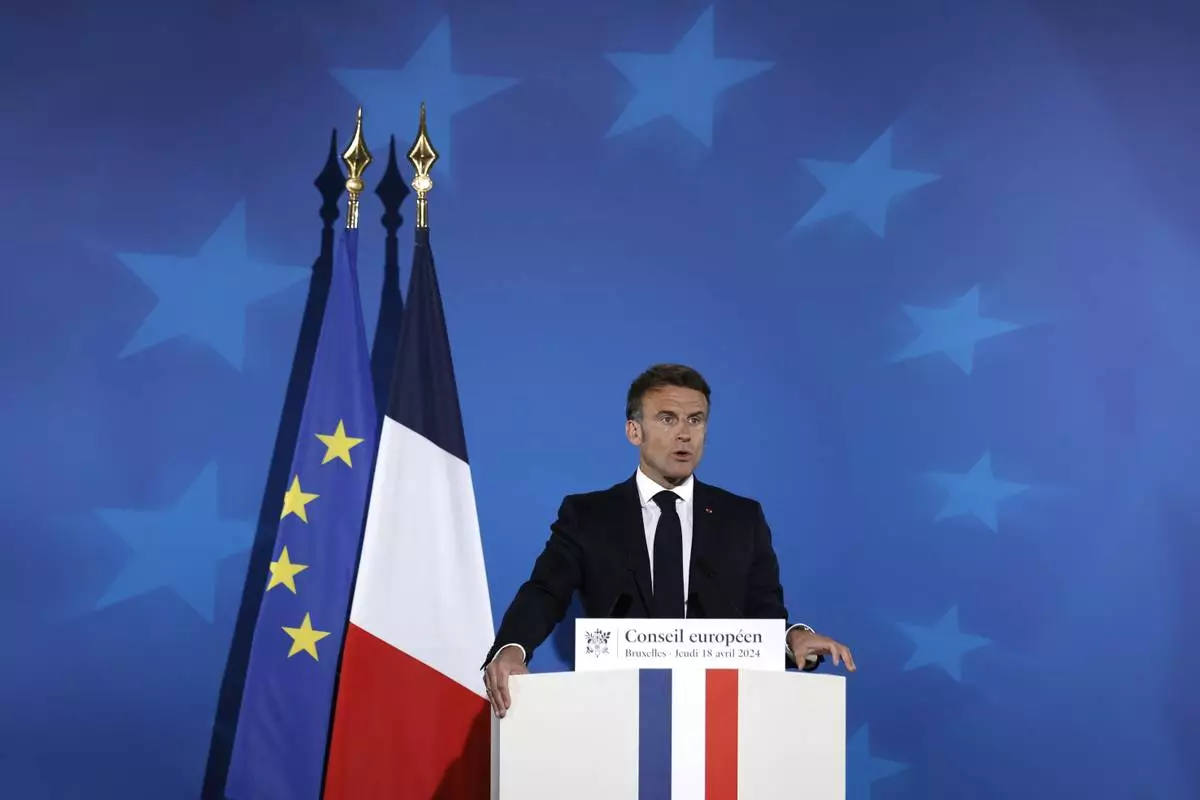
French President Emmanuel Macron speaks during a media conference at an EU summit in Brussels, Thursday, April 18, 2024. European Union leaders on Wednesday debated a new "European Competitiveness Deal" aimed at helping the 27-nation bloc close the gap with Chinese and American rivals amid fears the region's industries will otherwise be left behind for good. (AP Photo/Omar Havana)



























